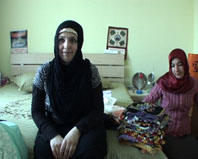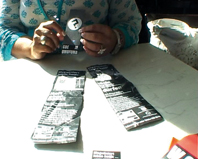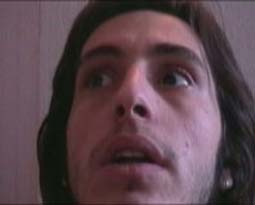A step to the right...
° A step to the right, 9 September - 3 October 2009
Opening:8 September, 19.00 – 21.30
Project curator: Gulsen Bal
Participant artist:
Songul Boyraz Petja Dimitrova Alban Muja
Close Up > Intro:
“The world does not exist outside its expressions.” Deleuze
The aim of the project A step to the right is to address different artistic strategies for questioning ‘space of interruption’ that shapes, orients and governs the power relations at the boundaries of “conditions of actuality” where ‘the power to live’ comes into play.
There one can and must give an argument that necessitates of facing with the production of new entities that revivify the “politics of becoming” in an encounter with looking into cases of living and working conditions of immigration as well as migration processes through which bio-power is performed, revealing racial hierarchies and capitalist imperatives in an account of precarious geopolitical realities within changing political geography in the course of producing futures to reflect the days we live in.
This is where one must come to existential terms with the emergency of what arrives out of the relationship between resistance and creation while seeking strategic dynamics “to transform the situation, to participate actively in the process.” This is also where the political engagement is cited in search for how to define the new outline of the possible by offering an argument on the relationship between the mobility and its exclusionary counterparts.
Toward emphasizing “new modes of social and political agency, new possible subjectivities and articulations that emerge”, the question poses itself as: “how does the sovereign condition the possibilities of mobility and structure resistance to the sovereign and make not only possible but necessary putting one’s self into this state” with bringing the temporalities and ‘positionalities’ onto surface?
To this extent, the critical exploration sets out an interruption of the typical structure and heterogeneous layers to trace ‘different points of emergence’ that maintain and generate the ‘art of governance’ into the production and parameters of new forms of life to establish in demoting them to some other place of existence afar taking a step to the right.
Info on artist:
Songul BoyrazImport Bride - Broken Dreams, video installation

In multi layered installation work Import Bride - Broken Dreams Songul Boyraz confronts the cultural norms and normalization process(es) that entails additional dilemmas within migrant status, particularly in woman’s situation in gated communities at the edge of exclusionary zones through pointing tensions between the particular and the universal habituality to surface.
This contains a reformulation of a new order of reference and geographically re-oriented cultural production from what rules migrants’ embodied experiences: “becoming” to a new kind of circularity of potential futures.
In epistemological portrayal of her plain conduct video home interviews make us to witness segregation nestle side by side into a myriad of sources to sketch. The temporalities and ‘positionalities’ marked by different constituent characteristics that make up distinct processes of social transformation. This is where the challenge is to go beyond at the intersection of enduring paradoxes of historical moments and ‘moments of crisis’ when relatively embedded social structures in which new constellations appear in relegating them to some place else, mapped out in: “what one is becoming and through which one becomes.”
Petja Dimitrovablue card for Keti, video installation
“I wanted to become always artist; it’s only my father who has turned my life upside down. He has enrolled me in a sports school so that I become a gymnast! … I wanted to live my own life and have packed my bags in 1989… Austria has never been my destination, but I stayed here and went through almost everything.”

The video-work blue card for Keti explores the story of a migrant from Bulgaria, who has lived in Vienna since 1989. What opportunities did she have, as an illegal singer and dancer, to perform in public and to gain recognition as an artist? How was its decades long artistic practice in local of the Serbian and Turkish Diaspora organized? What knowledge has she acquired? Which methods for legalisation and stabilisation of her stay did she employ in Austria during the 1990s and which role did her marriage to an Austrian policeman play in this context? What is her current situation now and what are her values?
Keti’s life and working conditions are typical of the struggles of migrants against precarity and widespread racism in Austria and give evidence of strategies against the predominant regulation of the population and restructuring of the European border regime since the fall of the “Iron Curtain“. Her journey through life is connected therefore closely with the story of the migration in Europe and illustrates those sex specific, emancipatory practices that flow in into collective processes of the resistance.
Indicated to historic events as well as to information and documents, which are discussed in the video, be brought together in form of an installation and have placed therefore a mapping of the Austrian migration politics since 1989.
Alban MujaFree Your Mind, video

Free Your Mind engages in the act of presentation of mediatised performances with the intention of “freeing (him)self” from a space of possibilities at the edge of becoming a ‘transformative agent’ inside margins and periphery beyond visual captivation presented in a dramatic narration including different multiplicity of references.
Muja emits loudly a selection of names, which is derived from international contemporary art scene, in ontology of potentiality of “converting them into empty sounds.” This is encoded into a void where a reality of representation that identifies not who they are and how things are, but rather identifies a space of possibilities a far side of “his own sovereign artistic identity” in reference to “the geopolitical realities of the environment he was born into.” In his work, Muja has sought to make visible the emergence of the idea of “Balkan” and “Balkanization,” both as a self-perception of insider and outsider in playful ways. Responding to the ascertaining geopolitical environment, the essential paradox of the old social bonds of locally defined community with the hazy consciousness of cultural anxiety mirrors an ‘autonomous’ existence. This also provides a set forth enunciation where the question is: how does it possible to produce art in a condition of engendering links between the past and the present where different visions are converging?
supported by:
BM:UKKStadt Wien - Kulturabteilung MA 7
About us:Open by appointment only, admission free
Open SpaceZentrum fuer KunstprojekteLassingleithnerplatz 2A – 1020 ViennaAustria
(+43) 699 115 286 32
for more info: office@openspace-zkp.org
Open Space - Zentrum fuer Kunstprojekte aims to create the most vital facilities for art concerned with contributing a model strategy for cross-border and interregional projects on the basis of improving new approach.
Mute Books Orders
For Mute Books distribution contact Anagram Books
contact@anagrambooks.com
For online purchases visit anagrambooks.com






